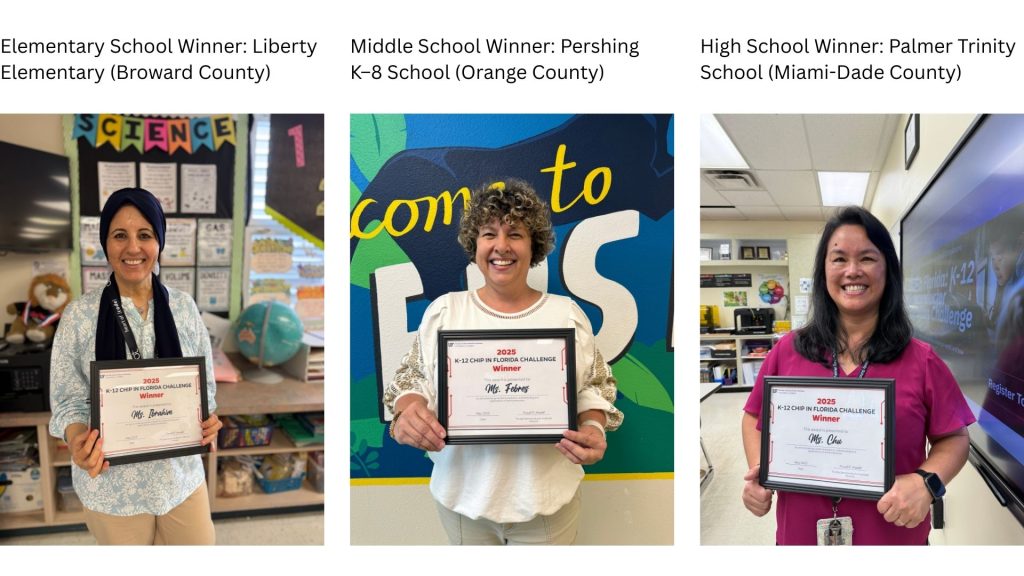Hundreds of classrooms participated statewide as students build, code, and imagine the future with semiconductors.
Florida Students Explore the Future of Tech in the “Chip in Florida” K–12 Semiconductor Challenge
This spring, over 170 educators across 29 Florida school districts joined the first-ever Chip in Florida: K–12 Semiconductor Education Challenge. This initiative inspired more than 12,000 students to explore semiconductors, the invisible technology powering today’s world.
Launched by the Florida Semiconductor Institute (FSI), this pilot initiative introduced students to semiconductors through hands-on lessons, creative problem-solving, and real-world career connections. Activities ranged from conductivity testing and chip design to student-built wearable tech and biomedical device research projects, making semiconductor education accessible at every grade level.
Each student was invited to answer a guiding question: “How do semiconductors shape our world, and how can YOU be part of the future of this industry?”
“Before this, I knew nothing about semiconductors,” said Justin, a fifth grader at Liberty Elementary. “Now I know how my phone and light switch work. I can see how everything works.” “We created this challenge to raise awareness early,” said Dr. Roseanne Perez, workforce development program specialist at FSI. “But what we saw was even more powerful — students not only understood the science, they saw themselves as future problem solvers.”
Winning Schools and Standout Projects

In STEM teacher Mrs. Manal Ibrahim’s class, elementary school students built robotic alligators using LEGO kits and sensors demonstrating how chips detect motion and power automated responses. “My students realized learning about technology can lead to exciting jobs that shape our world,” said Mrs. Ibrahim. “Their excitement and teamwork were incredible.”
Under Ms. Heather Febres, middle school students developed Micro:bit prototypes to address teen mental and physical health — connecting coding, creativity, and real-world impact. “At first, they struggled with abstract ideas,” she shared. “But watching them develop complex programs and collaborate to bring ideas to life made me incredibly proud.”
“Before this, I had no idea what a semiconductor was,” said Ava, a middle school student. “Now I know what it is, how it works — and how it could help us in the future.”
Led by physics teacher Ms. Susy Chu, high school students submitted 25 future-forward solutions from NerveBridge, a chip-powered device that simulates nerve signals, to AI-powered drought irrigation systems and MediPath, a smart health monitor. “The hardest part was coming up with the ideas,” said Johanny, a high school student. “But once we shared and listened to each other, the creativity exploded. We were free to think beyond the limits.”
Each winning teacher was surprised in-person by Dr. Perez, who awarded them a winner’s certificate, classroom prizes, and robotics kits provided by the Chip In Florida partners, XTool and Ozobot.
“This challenge showed my students how semiconductors power everything from climate tech to healthcare,” said Ms. Chu. “They didn’t just learn, they envisioned the future.”
Building Momentum Across Florida
In addition to classroom participation, FSI hosted virtual grade-level webinars with behind-the-scenes semiconductor facility tours, hands-on trivia games, and Q&A sessions. These webinars also featured interactive demonstrations of how semiconductor chips are made at the University of Florida’s Nanoscale Research Facility “Fab Lab.” Live interaction and Q&A with real life semiconductor engineers gave students a glimpse into the world of cleanroom semiconductor production. Teachers expressed strong interest in more professional development, in-person presentations, and a semester-long curriculum to deepen student understanding.
What’s Next
FSI has launched a post-survey to gather insights and share findings with state and national partners. This Fall, FSI will roll out a new initiative to bring K–12 Semiconductor Clubs to schools across Florida—providing students with year-round opportunities to explore microelectronics and spark interest in high-tech careers. Subscribe to our mailing list to be the first to know when the program launches and how your school can get involved.
FSI welcomes new industry and educational partners who want to help scale this effort. Let’s work together to plant seeds of innovation in every corner of Florida’s classrooms.
“We’re proud to support the next generation of semiconductor talent—starting in classrooms,” Dr. Perez added. “When I visited these schools and saw the students light up with excitement, it reminded me why this work matters.”
